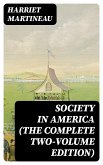In "Society as I Have Found It," Ward McAllister provides a candid and richly detailed portrait of the New York elite during the Gilded Age, a period characterized by opulence and social stratification. His narrative is imbued with sharp wit and an engaging prose style, which captures the complexities and contradictions of high society. McAllister's observations encompass the social rituals, cultural dynamics, and the often fraught relationships that defined elite interactions, offering a unique lens through which to explore the sociopolitical landscape of America in the late 19th century. Ward McAllister, a prominent social figure and autobiographer of his time, was deeply entrenched in the world he depicts in his work. A self-made man, McAllister rose to prominence as a social arbiter and commentator, known for his involvement in influential circles. His firsthand experiences and keen observations of societal norms and expectations provided him with the material necessary to craft an incisive critique of the social order, informed by the complexities of his own ambitions and encounters among the affluent. "Society as I Have Found It" is not merely a memoir but an essential historical document that invites readers to explore the intricacies of class and culture in an era marked by change. It is a recommendable read for anyone interested in American history, social dynamics, and the enduring impacts of class on human relationships. In this enriched edition, we have carefully created added value for your reading experience: - Hand-picked Memorable Quotes shine a spotlight on moments of literary brilliance. - Interactive footnotes clarify unusual references, historical allusions, and archaic phrases for an effortless, more informed read.
Dieser Download kann aus rechtlichen Gründen nur mit Rechnungsadresse in A, B, BG, CY, CZ, D, DK, EW, E, FIN, F, GR, H, IRL, I, LT, L, LR, M, NL, PL, P, R, S, SLO, SK ausgeliefert werden.









